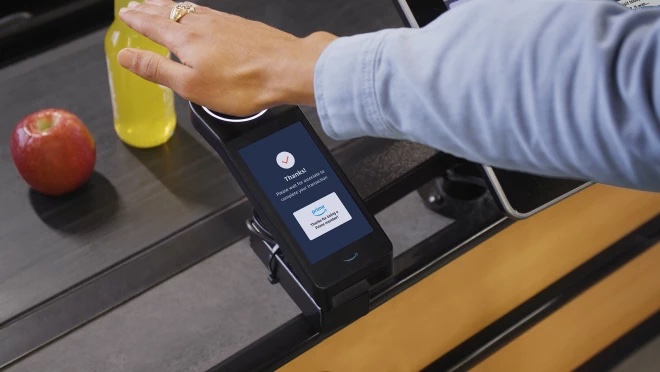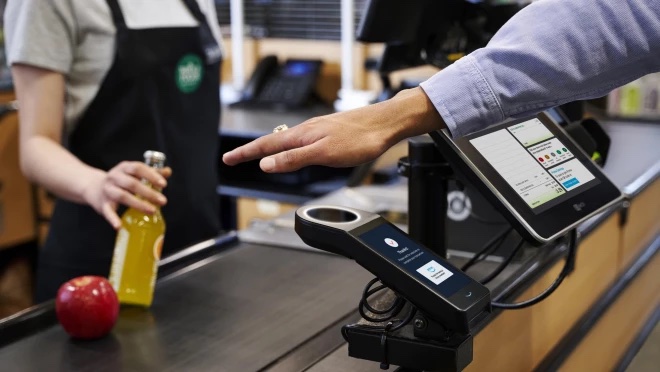Amazon’s palm-scanning payment technology known as Amazon One is prepared to make a significant expansion across the U.S. The retailer announced this morning the payment tech will come to all 500+ Amazon-owned Whole Foods Market stores nationwide by year-end. The biometric payment system works by having the customer hover their palm above a reader device. The device then identifies the individual’s unique palm signature which is then associated with the customer’s payment card on file in order to charge them for their purchases.
Since the technology’s launch in 2020, Amazon One’s service has been established at more than 400 locations across the U.S., the retailer notes, and has reached a milestone of over 3 million uses. These locations have included Amazon’s own retail stores, including its Amazon Go convenience stores, as well as various sports stadiums, entertainment venues and travel retailers like Hudson, CREWS and OHM at several U.S. airports, in addition to Panera Bread through a partnership announced in March 2023.
Stadiums using the tech include Bridgestone Arena, Climate Pledge Arena, Globe Life Field, Lumen Field, T-Mobile Center, T-Mobile Park, NASCAR Raceway and Texas A&M’s Kyle Field, along with entertainment venue Hollywood Casino at Greektown in Detroit and others.
The system has also been steadily rolling out to Whole Foods locations, ahead of today’s announcement. Currently, Amazon One is available at over 200 Whole Foods Markets in the U.S., including in Arizona, Arkansas, California, Colorado, Idaho, Kansas, Louisiana, Michigan, Mississippi, Missouri, Montana, Nevada, New Mexico, New York, Oklahoma, Oregon, Texas, Utah, Washington and Wyoming. It will now expand nationwide over the last half of the year.
With its expansion to Whole Foods, shoppers won’t need to have their wallet or even their phone in order to make a purchase — they’ll just use their palm to pay, explains Amazon. In addition, Prime subscribers who link their Amazon One profile with their Amazon account will automatically have savings applied as a membership perk.
Recently, Amazon announced the reader would also be able to verify customers’ ages, allowing customers to use the device to purchase adult beverages — like beer at a sports event — just by hovering their palm over the reader. Coors Field was the initial adopter of this version of the system, Amazon said in May. It’s not clear if this part of the system will also work at Whole Foods or if customers will need to show their ID to store staff, as is common with most other self-checkouts.

To use the system, customers can pre-enroll via the web using their credit or debit card, Amazon account and mobile number in about a minute. Amazon has partnerships with American Express, Discover, Mastercard, Visa and other major U.S. banks, it says. Customers then complete their enrollment process the first time they scan their palm over the Amazon One device when visiting a participating Whole Foods location. They also can choose to register at an Amazon One device in the store, if they prefer.
“We are always looking for new ways to delight our customers and improve the shopping experience,” said Leandro Balbinot, chief technology officer at Whole Foods Market, in a statement about the expansion. “Since we’ve introduced Amazon One at Whole Foods Market stores over the past two years, we’ve seen that customers love the convenience it provides, and we’re excited to bring Amazon One to all of our customers across the U.S.”
Amazon insists that customer information is secure in its own AWS Cloud, where it’s protected by multiple security controls. Plus, it notes it’s not actually using the palm image to identify the customer, but rather a palm “signature.” That’s determined by looking at the palm and underlying vein pattern to create a unique, numerical, vector representation for identity matching.
Of course, Amazon’s entry into biometric payments isn’t only about speeding up checkout lines for customers’ convenience. By combining biometrics with payment card information and Amazon accounts, the retailer has created a system that could track customers in both the online and offline world, then serve highly personalized ads and recommendations, which would boost its revenue.
In an earlier version of an Amazon One FAQ, however, the retailer claimed it “does not use or sell customer information for advertising, marketing, or any other reasons.”
Today, a new FAQ clarifies its stance further, saying:
Amazon One will never share palm data with third parties, under any circumstance, including in response to government demands, unless we’re required to comply with a legally valid and binding order. Additionally, Amazon One is not interoperable with data provided by other sources. This is because Amazon One uses a proprietary combination of palm and vein imagery to recognize customers, making it unusable to third parties and unmatchable with data from other sources. Further, Amazon One palm data is not used by Amazon for marketing purposes, and it will not be bought by or sold to other companies for advertising, marketing, or any other reason. In fact, when you use Amazon One at third-party locations, Amazon doesn’t track what you do or buy after entering the location. That data is not associated with your biometric identity, and we built Amazon One that way intentionally.
Despite the retailer’s assurances, Amazon One’s technology has been the subject of privacy concerns since its launch, leading one early adopter to choose to abandon their plans to use the readers after receiving pressure from consumer privacy and advocacy groups. Denver Arts and Venues had once been planning to leverage Amazon One for ticketless entry at Red Rocks Amphitheater — which would have been a big win for Amazon — but it cut ties with the retailer after the publication of an open letter that suggested Amazon could share palmprint data with government agencies and that it could be stolen from the cloud by hackers.
A group of U.S. senators also pressed Amazon for more information about its plans with customer biometrics in 2021 shortly after the technology’s launch. More recently Amazon was reported to be facing a class action lawsuit over failure to provide proper notice under an NYC biometric surveillance law, related to the use of its Amazon One readers at Amazon Go stores.
Amazon’s palm-scanning payment tech will now be able to verify ages, too































Comment